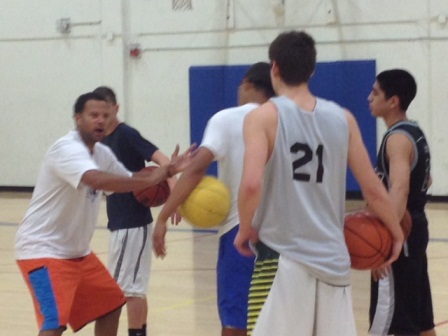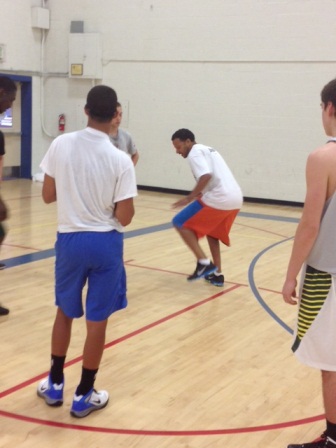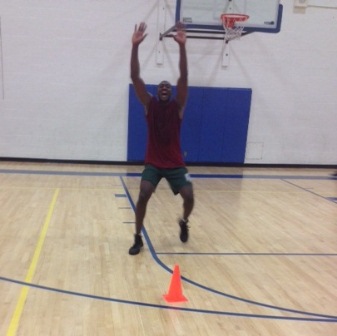 Kumbeno Memory talking with his players after a dribbling drill |
The documentary "Hoop Dreams" begins with clips of bright eyed teenagers Arthur Agee and William Gates playing basketball on the courts of Chicago and proclaiming their love for the game. It follows them for five years as they experience highs and lows in their efforts to make it to the next level.
When you walk into Kumbeno Memory's gym and see 11-year-old Isaac Rosenthal panting as he does extra shooting drills with a professional more than twice his size, you can see why Memory named his business after the award winning film.
"There is a culture that is set in our gym," says the 35-year-old basketball skills coach. "We foster teaching work ethics."
Memory started Hoop Dreams Basketball in 2002. The program provides basketball skills and conditioning training for hoop enthusiasts as young as eight and operates five times a week at the Mittleman Jewish Community Center. Although the coach doesn't consider himself business minded, he has used his love of basketball and appetite for learning to expand his business and help his Dreamers (participants) grow as players and people.
 Memory demonstrating defensive slides |
"I had no idea what kind of impact basketball could have," says Chantal Rosenthal, Isaac's mother. "Now everything is 100 percent. His schoolwork. His focus."
Isaac was only six when he first saw a Hoop Dreams workout. He decided the intensity appealed to him. Now he participates in all available workouts with both younger and older players.
"He goes in before workouts and shoots," says Chantal. "When he comes home he does pushups and sit-ups. He doesn't eat any junk food."
Memory didn't start playing organized basketball until the sixth grade. The son of renowned Portland musician Thara Memory says he was throwing the ball off the backboard to himself, which shows how serious he was at the time.
Despite getting a taste of varsity experience as a sophomore at Jefferson, he played strictly JV as a junior after he transferred to Cleveland.
Memory was disappointed at the time but took the experience as a blessing in disguise. Playing JV allowed him to run the point guard position and build his basketball IQ.
"I can relate to players from all different levels, whether you're talented or not the most talented," he says. "I come from that cloth."
 A Hoop Dreams participant practicing closing out |
By the time he graduated, he was skilled enough to play college ball. His stops included College of the Desert, Clark College, Belmont Abbey and the now defunct Cascade College program.
Memory had no intentions of coaching. After college, he temporarily worked at FedEx and the Olive Garden. He also did odd jobs.
As fate would have it, he was playing pickup games at the Blazers' practice facility with his good friend and former Blazer Ime Udoka, when one of the assistant coaches, Dan Panaggio, suggested Memory coach his son's sixth grade team. Panaggio was impressed by his play and the way he communicated on the court.
When Memory interviewed with the Tualatin Youth Association, they said he was overqualified, despite never coaching before, and placed him with an 8th grade team. During that season, he took advantage of other coaches' cancelled practices and used their gym time to get extra work in with his players.
The experienced motivated Memory to look for a gym so he could turn coaching into a business. His search would lead him to the Portland Athletic Club and one of his first clients, the owner's grandson and former Grant High star Dominic Waters.
"That's my big brother," says Waters. "I tell him I love him every time I get off the phone with him. He's had such an impact on my life, on and off the court, teaching me how to develop as a man as well as teaching me life lessons that he's gone through."
 "He made me stronger as a player. He made me smarter."
"He made me stronger as a player. He made me smarter."
Waters, who will be playing professionally in Slovenia this upcoming season, was one of many Dreamers that benefited from Memory's desire to get his players into college.
Shortly after Hoop Dreams began, Memory decided to use his spare time to seek out help with recruitment. He would send emails and bios to college coaches throughout the country.
From 2007-2009, he ran the I-5 Elite AAU program, which was nationally recognized for its success in tournaments and in getting players exposure.
The list of Dreamers on the Hoop Dreams site reads like a who's who of Oregon's high school and college talent, including recent NBA draftees and Jefferson High alums Terrence Jones and Terrence Ross.
Despite his AAU success and murmurs of more lucrative prospects in his future, Memory has continued to focus on building Hoop Dreams through the same hard work and discipline he tries to instill in his players.
He says he is constantly going to practices at various levels, reading coaches' booklets and blogs and watching videos to find new drills and tweak current ones.
 The advent of social media has also helped Memory reach basketball enthusiasts. He says he wasn't big on sites like Facebook and Twitter before but he has learned how to use them to enhance his brand.
The advent of social media has also helped Memory reach basketball enthusiasts. He says he wasn't big on sites like Facebook and Twitter before but he has learned how to use them to enhance his brand.
Memory's Facebook page is an ongoing discussion of basketball related topics, with the coach often posing questions to his followers on anything from what makes a good defender to comparisons of past and present NBA greats. He also posts videos of drills, as well as articles highlighting Dreamers' achievements.
"I'm big on wanting to spread the word," says Memory. "I know how much work those guys have put in the gym to get where they're at."
By the end of September, Hoop Dreams plans to begin releasing a weekly video series. It will feature Memory talking directly to his audience about anything from shooting technique to AAU basketball.
He is also looking to expand Hoop Dreams' physical presence by taking clinics to smaller towns throughout Oregon. The program recently held a clinic in Lebanon and has others scheduled in cities such as Salem and Sisters.
 Memory says there is a possibility that other Hoop Dreams branches might pop up in the future. If that does happen he wants the atmosphere to be exactly the same as it is here. Some of his players have gone on to coaching and he says those are the kinds of guys he would trust to run the program in smaller markets.
Memory says there is a possibility that other Hoop Dreams branches might pop up in the future. If that does happen he wants the atmosphere to be exactly the same as it is here. Some of his players have gone on to coaching and he says those are the kinds of guys he would trust to run the program in smaller markets.
In the meantime, Memory says he is focused on teaching his pupils the right way to play basketball and helping them reach the next level.
While he says the work they do speaks for itself, the endorsements from coaches, players and parents ring pretty loud too.
"There's nothing like it," says Waters. "I think if people focus clearly on basketball and want to improve, there's nobody like him because he knows as long as you stay in the gym with him, listen and learn, there's no reason you can't be at a high level."
For more information, go to www.hoopdreamsbasketball.org.










